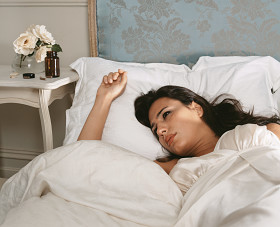For millions of Americans, sleep can be an unfortunately elusive state. Chronic insomnia has a lifetime incidence of 30-50% in the US, and impacts one’s quality of life and level of daytime functioning. Most cases of insomnia are transient in nature and related to poor sleep habits (see below) or stress. The remaining 10-15% of cases are chronic and typically secondary to a variety of medical, psychiatric, substance-related, or primary sleep disorders.
Most importantly, what can you do to improve your sleep quality?
- Identify any factors that may be precipitating your sleep troubles such as specific stressors, shift work, jet lag
- Discuss with your doctor whether any underlying medical or psychiatric problems may be contributing to your sleep disturbance
- Keep a sleep diary: example located at http://yoursleep.aasmnet.org/pdf/sleepdiary.pdf
- Practice good sleep hygiene
What is good sleep hygiene? Here are some tips:
Maintain a regular sleep schedule
- Go to bed and wake up at the same time every day
- Avoid napping late in the afternoon or for longer than 20-30 minutes
- Spend no more than 8 hours in bed, and only sleep/stay in bed as long as you need to feel rested (usually 7-8 hours)
- Expose yourself to regular daytime sun or light
Avoid substances
- Avoid caffeine within 6-8 hours of your bedtime
- Nicotine is a stimulant and should be avoided especially around bedtime and during night awakenings
- Avoid using alcohol to help you fall sleep. Alcohol may promote drowsiness but impairs deeper levels of sleep and can fragment sleep
Stimulus control
- Go to bed only when sleepy
- Keep your bedroom for sleeping and sex only (e.g. avoid reading, watching TV, eating, worrying in bed)
- If you can’t fall asleep within 30 minutes or if you wake up in the middle of the night, go into another room to read or listen to soothing music. Return only when sleepy.
Relaxation therapy
- Wind down at night (e.g. read a relaxing book or magazine, take a warm bath)
- Stop working on any task an hour before bedtime to calm mental activity
- At bedtime, keep your mind off worries and avoid discussing emotional issues in bed
- If the above recommendations fail, learn a relaxation technique such as meditation, progressive muscle relaxation, or visual imagery and practice it in bed
Sleep environment
- Maintain a quiet, dark bedroom (consider earplugs, heavy curtains, eye mask)
- Do not turn on bright lights if you get up at night. Use a small night-light instead.
- Make sure your bed and pillows are comfortable.
- Keep your bedroom well ventilated and at a comfortable temperature (below 75F and above 54F)
Additional tips
- Avoid large meals within two hours of bedtime. If you are hungry, a glass of milk or a light snack is a good choice
- Get 20 minutes of aerobic exercise during the day to reduce stress hormones, but avoid anything strenuous within three hours of bedtime. Regular exercise may promote deeper sleep
- Consider having pets stay outside of your sleeping area as they may wake you up if you have allergies or if they move around on the bed
Here’s to a good night’s sleep!
Resources:
Silber MH. Chronic insomnia. N Engl J Med. 2005; 353(8):803-10. http://dx.doi.org/10.1056/NEJMcp043762
Summers MO, Crisostomo MI, Stepanski EJ. Recent developments in classification, evaluation and treatment of insomnia. Chest. 2006;130:276-86.
Weilburg JB. Approach to the patient with insomnia in primary care medicine: office evaluation and management of the adult patient. Edited by Allan H. Goroll, Albert G. Mulley 6th ed. 2009.



